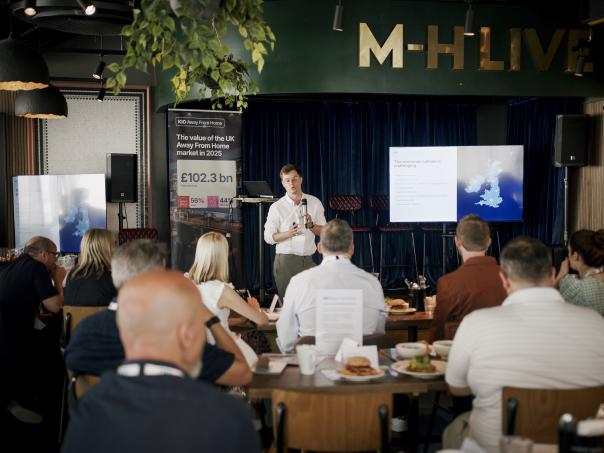
The panel was held to highlight the launch of IGD’s new Away From Home (AFH) report, aimed to provide the industry with targeted, relevant, and timely data across the UK’s out-of-home sector.
From AI-driven tech and data-driven decisions to the rise of weight loss drugs, the panellists emphasised that ‘agility, experience, and insight’ will shape the next phase of industry growth.
Chaired by Nicola Knight of the IGD, the panel featured Spencer Craig, founder and chief executive of Pure, the workplace and on-the-go caterer; Stewart Down, business owner of Black Bear Burger and 20ft Fried Chicken; Harry Ridley, head of technology at Levy UK & Ireland; and David Marazzi, venue director of Levy UK & Ireland, O2 Arena.
Despite ongoing cost pressures and slow real-term consumer recovery, the tone was positive, with a clear focus on innovation, responsiveness, and adding value.
Using technology to enhance experiences
With consumers prioritising experiences over possessions, especially post-pandemic, the panel agreed that operators must deliver more than just a meal.
“We’ve got a ready-made customer base,” said Marazzi, “but they’re in London, one of the centres of culinary excellence in the world. We’ve got to use tech and data to optimise all our outlets. It’s this competition and the state of the market that is driving us to deliver at a very high level. Hospitality is not just opening a restaurant and providing a good meal, it’s a whole package.”
Ridley echoed the focus on customer experience, pointing to the strategic use of AI, automation, and queue management to reduce friction and build hospitality around fan behaviours.
“Within Levy, we're looking at each process and how we can leverage the right technology,” he said. “We obsess about the challenge and the problem that we have, which is mainly queuing – massive peak demand within five to seven minutes that we need to try and handle as well as we can, to the highest quality that we can.”
He mentioned leveraging frictionless stores as well as AI scanning and tracking.
“We can also use technology to review operations, and that's the key thing that we need to remember – technology is great at driving volume, driving throughput, driving orders but if you can't fulfil those orders, we're letting people down and they’re queuing twice.”
Expanding channels and creating opportunities
Operators are moving beyond traditional formats to tap into new revenue streams. Craig outlined how Pure has expanded into workplace delivery and travel, to meet consumers where they are – and the company has recently launched a wholesale range.
IGD’s Knight also highlighted the vending opportunity, driven by smarter technology.
“There’s such a big place for vending – and a greater acceptance since the pandemic and the rise of contactless technology.”
Ridley agreed, citing advances in vending that are driving the platform forward.
“I think having the ability to transact in your own way is really important,” he said. He also mentioned the power of having thousands of digital screens. “You’re probably going to make more revenue out of selling the digital space. You can tell a story on screen, such as sustainability or where a product comes from.”
Black Bear Burger’s Down offered an independent operator’s view, underscoring the power of value-led experiences in attracting repeat visits: “We've got a mix of both QSR and dine-in restaurants, and we're actually seeing a contradiction to some of the other players in the market.
“We're seeing strong growth from both sides of those of the business. We hit a sweet spot in terms of delivering a really great quality product, but at value. And I think that's what the customer wants these days.”
Data-led decisions: the new competitive advantage
Data was a recurring theme, with panellists agreeing that robust insight, whether from advanced systems or direct customer interaction, is vital for staying ahead.
Marazzi said: “One of the things that we found through use of data, especially at the O2, is how different the demographics are in their behaviour. Data is really important to us to plan ahead and decide what products to sell.
Marazzi mentioned a forthcoming Billie Eilish show. “It’s a completely plant-based, sustainability driven tour.”
Meanwhile, Down explained how smaller operators can be insight-driven: “I personally still manage all of our Google reviews for each of our sites because that’s really where you get instant feedback. Being as close to the customer as possible is so important, especially when there’s plenty of other offerings.”
Shifting landscape: the rise of weight loss drugs
Emerging behaviours are forcing operators to adapt, including the rising use of GLP-1 weight loss drugs such as Ozempic and Wegovy. Though early days, panellists noted that some premium operators are already seeing changes in ordering habits – from smaller portions and fewer sides to more tapas-style sharing formats.
“It’s one to watch,” said Knight. “We’re doing consumer research to forecast the impact, especially in more affluent markets where uptake is higher because use is being funded by the individual in many cases. Operators will need to adapt their offer accordingly.”
Conclusion: challenges persist, but so do opportunities
Despite macroeconomic headwinds, the panel painted a picture of a sector alive with ideas and resilient in the face of adversity.
“We’ve heard lots of ideas from the panel about how they are improving experiences, using technology creatively and reacting to changes, to ultimately deliver a quality product in a quality setting,” concluded Knight.
“The winners in AFH will be those who focus on experience, test new models, and ground their decisions in data.”